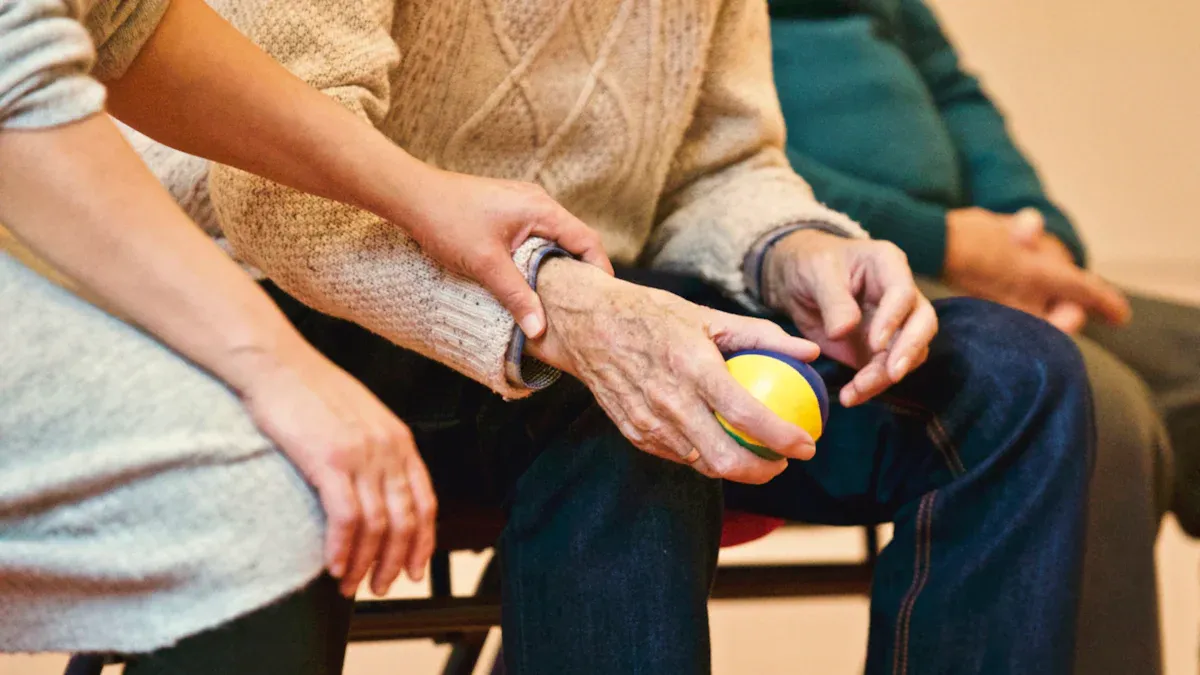Practical Tips for Managing Stress as a Cancer Caregiver

Being a caregiver for someone with cancer can feel overwhelming. You may find yourself juggling medical appointments, emotional support, and daily responsibilities, often at the expense of your own well-being. Studies show that over 46% of caregivers experience severe anxiety, and nearly 53% report significant depression. Coping with the emotional toll of caregiving to cancer patients is essential for managing stress, which isn’t just about feeling better—it’s about protecting your health. Research links high stress levels to weakened immune systems and poorer physical health. By learning effective strategies for coping with the emotional toll of caregiving to cancer patients, you can improve not only your life but also the quality of care you provide.
Key Takeaways
Notice when you feel stressed or worn out. Write in a journal to track feelings and spot stress early.
Take care of yourself by exercising, eating healthy, and sleeping well. Little changes can make you feel much better.
Find people to support you, like friends, family, or groups. Talking about your feelings and asking for help can lower stress and boost your mood.
Recognizing Emotional Stress
Signs of Stress and Burnout
As a caregiver, you might feel like you're constantly running on empty. It's not uncommon to experience emotional and physical exhaustion, but recognizing these signs early can make a big difference. Here are some common symptoms of stress and burnout among cancer caregivers:
Emotional exhaustion, like feeling drained or overwhelmed.
Withdrawal from friends, family, or activities you once enjoyed.
Irritability, frustration, or even anger over small things.
Trouble concentrating or making decisions.
Changes in appetite, weight, or sleep patterns.
Feelings of hopelessness or helplessness.
Studies show that more than 60% of caregivers experience burnout, with depression and anxiety affecting up to 59% and 50%, respectively. These symptoms aren't just "part of the job"—they're signals that your body and mind need attention.
Tip: Keep a journal to track your emotions and physical health. Writing things down can help you spot patterns and identify when stress is building up.
Why Awareness is Key
You can't fix what you don't notice. Being aware of your stress levels is the first step toward managing them. Research highlights that caregivers who monitor their stress are better equipped to handle challenges. For example, participants in one study emphasized the importance of meaningful data, like stress scores, to help them recognize triggers and take action.
Awareness also improves caregiving outcomes. A review of clinical trials found that recognizing emotional stress led to decreased depression within three months for many caregivers. Here's a quick look at the data:
Study Type | Sample Size | Outcome | Effect Size (RoM) | Confidence Interval (95% CI) |
|---|---|---|---|---|
RCTs | 3,650 | 0.83 | 0.69–0.99 | |
RCTs | 2,870 | No effect on depression after 3 months | 0.99 | 0.83–1.20 |
RCTs | N/A | Significant improvement in anxiety | N/A | N/A |
By staying aware, you can catch stress before it spirals out of control.
Note: Pay attention to physical signs like headaches or fatigue. These can be early indicators of emotional stress.
Coping with the Emotional Toll of Caregiving to Cancer Patients
Caring for someone with cancer is emotionally demanding, but you don't have to face it alone. Proactive coping strategies can help lighten the load. Studies show that social support plays a huge role in reducing the emotional toll of caregiving. When you lean on friends, family, or support groups, you're more likely to use positive coping methods and less likely to feel overwhelmed.
Here are some practical ways to cope:
Talk about your feelings. Whether it's with a friend, a therapist, or a support group, sharing your emotions can be incredibly freeing.
Set realistic expectations. You can't do everything, and that's okay. Focus on what you can control and let go of the rest.
Take breaks. Even a short walk or a few minutes of deep breathing can help you reset.
Celebrate small wins. Did you manage to get through a tough day? That's a victory worth acknowledging.
Remember, coping with the emotional toll of caregiving to cancer patients isn't about being perfect. It's about finding what works for you and taking small steps toward a healthier mindset.
Tip: Consider joining a caregiver support group. Connecting with others who understand your struggles can provide comfort and practical advice.
Self-Care Strategies for Caregivers

Prioritizing Physical Health
Taking care of your physical health is one of the best ways to manage stress as a caregiver. When you feel strong and healthy, you're better equipped to handle the challenges of caregiving. Regular exercise, a balanced diet, and adequate sleep can make a huge difference in how you feel both physically and emotionally.
Studies show that physical activity reduces psychological stress and caregiver burden. It also improves mental health by lowering anxiety and depression. Even simple activities like walking, stretching, or yoga can help. Home-based exercise programs are particularly effective because they're accessible and cost-friendly.
Study Focus | Findings |
|---|---|
Effects of physical exercise on caregiver burden | Regular physical activity reduces stress and improves overall health. |
Impact on mental health | Exercise promotes mental well-being and reduces anxiety and depression. |
Cost-effectiveness of interventions | Home-based programs are affordable and easy to follow. |
Tip: Start small. A 10-minute walk around your neighborhood or a quick workout video at home can be a great way to get moving.
Don't forget about nutrition. Eating well-balanced meals fuels your body and mind. Try to include plenty of fruits, vegetables, lean proteins, and whole grains in your diet. Staying hydrated is just as important—drink water throughout the day to keep your energy levels up.
Finally, prioritize sleep. Aim for 7-8 hours of rest each night. If you're struggling to fall asleep, consider creating a bedtime routine, like reading or listening to calming music. Sleep is essential for recharging your body and mind.
Practicing Mindfulness and Relaxation
Mindfulness and relaxation techniques can help you stay grounded and reduce stress. These practices encourage you to focus on the present moment, which can be especially helpful when you're feeling overwhelmed.
Research highlights the effectiveness of mindfulness-based programs in lowering caregiver stress. For example, one study found that caregivers who participated in a mindfulness-based stress reduction program experienced significant improvements in their quality of life. Another study showed that mindfulness training reduced stress levels and improved psychological well-being for both caregivers and care recipients.
Study Title | Findings | Statistical Significance |
|---|---|---|
The Effect of Mindfulness-Based Stress Reduction Program on Stress and Quality of Life in Family Caregivers | Significant reduction in stress levels and increased quality of life. | TIME x GROUP interaction: F(1, 102) = 6.35; p = 0.001. |
Effectiveness of Caregiver Training in Mindfulness-Based Positive Behavior Support (MBPBS) vs. Training-as-Usual | Caregivers significantly reduced their stress levels and the use of restrictive procedures. | MBPBS is a viable approach to improve psychological well-being. |
You can try mindfulness exercises like deep breathing, meditation, or progressive muscle relaxation. These techniques don't require much time or equipment, making them easy to fit into your day. Apps like Headspace or Calm can guide you through short mindfulness sessions.
Note: Even a few minutes of mindfulness can make a difference. Try taking five deep breaths right now and notice how your body feels.
Relaxation isn't just about mindfulness. It can also mean doing something you enjoy, like listening to music, gardening, or taking a warm bath. Find what helps you unwind and make it a regular part of your routine.
Finding Time for Personal Interests
As a caregiver, it's easy to lose sight of your own hobbies and interests. However, making time for activities you love is crucial for your well-being. Engaging in personal interests can provide a much-needed mental break and help you recharge.
Self-care studies emphasize the importance of balancing caregiving responsibilities with personal time. The Self-Care of Informal Caregivers Inventory highlights the unique barriers caregivers face in maintaining their health. It also shows that self-management approaches allow caregivers to tailor strategies to their specific needs.
Informal caregiving is becoming more common due to the rising number of patients with chronic illnesses.
Chronic stress from caregiving can lead to mental health issues.
Support interventions, like self-management programs, reduce caregiver burden.
Think about what makes you happy. Do you enjoy painting, reading, or baking? Maybe you love spending time outdoors or watching your favorite TV show. Whatever it is, carve out time for it. Even 15-30 minutes a day can make a big difference.
Tip: Schedule your personal time like you would a doctor's appointment. Treat it as non-negotiable.
If you're struggling to find time, consider delegating some caregiving tasks to others. Asking for help isn't a sign of weakness—it's a way to ensure you have the energy to keep going. Remember, taking care of yourself isn't selfish. It's an essential part of coping with the emotional toll of caregiving to cancer patients.
Building a Support System

Reaching Out to Friends and Family
You don’t have to face caregiving alone. Friends and family can be a great source of emotional and practical support. When you reach out, you create opportunities for connection and relief. Studies show that caregivers with meaningful relationships experience lower stress levels and greater life satisfaction.
Social support reduces caregiver strain, making it easier to cope with challenges.
Strong relationships with friends and family lead to better emotional health.
Community connections improve life satisfaction and reduce symptoms of stress.
Start by sharing your feelings with someone you trust. Let them know how they can help, whether it’s running errands, cooking meals, or simply listening. Even small gestures can make a big difference.
Tip: Don’t hesitate to ask for help. People often want to support you but may not know how unless you tell them.
Joining Caregiver Support Groups
Support groups offer a safe space to connect with others who understand your struggles. These groups can provide emotional comfort, practical advice, and a sense of belonging. Research highlights the benefits of structured programs, such as psychoeducation courses and group therapy, in reducing caregiver burden and improving coping strategies.
Dementia caregiver programs improve quality of life and reduce stress.
Psychoeducation for schizophrenia caregivers enhances patient outcomes and lowers caregiver strain.
Group therapy for bipolar caregivers leads to better emotional health.
Look for local or online support groups tailored to your needs. Many organizations offer free or low-cost options, making them accessible to everyone.
Note: Joining a group can help you feel less isolated and more empowered to handle caregiving challenges.
Communicating Needs Effectively
Clear communication is key to building a strong support system. When you express your needs effectively, you’re more likely to receive the help you need. Studies show that caregivers who use short sentences and verbal reassurance experience better outcomes, including reduced stress and improved relationships.
Evidence Type | Findings | Implications for Caregivers |
|---|---|---|
Pilot Study | Improved communication between caregivers and healthcare professionals | Reduced caregiver burden and enhanced confidence in caregiving |
Health Literacy Issue | Only 12% of American adults are proficient in health literacy | Many caregivers struggle to make informed healthcare decisions |
Caregiver Burden | Associated with anxiety, depression, and sleep disturbances | High caregiver burden can lead to institutional care and social issues |
Care Talks Program | Participants reported increased confidence in communication skills | Potential for long-term positive effects on caregiver health |
Start by being direct and specific about what you need. For example, instead of saying, “I’m overwhelmed,” try, “I need help with grocery shopping this week.” This makes it easier for others to step in and support you.
Tip: Practice active listening when communicating with others. It helps build trust and ensures your needs are understood.
Setting Boundaries and Managing Priorities
Saying No Without Guilt
As a caregiver, you might feel like you have to say "yes" to everything. But constantly agreeing to every request can leave you drained. Learning to say "no" is one of the most powerful tools you have. It’s not about being selfish—it’s about protecting your energy so you can focus on what truly matters.
Start by recognizing your limits. You can’t do everything, and that’s okay. When someone asks for your time or help, pause and think about whether it aligns with your priorities. If it doesn’t, politely decline. For example, you could say, “I’d love to help, but I’m not able to right now.” This approach is honest and respectful.
Remember, saying "no" doesn’t mean you’re letting anyone down. It means you’re taking care of yourself, which ultimately helps you be a better caregiver.
Delegating Responsibilities
You don’t have to do it all alone. Delegating tasks to others can lighten your load and improve your well-being. Sharing responsibilities with family members or friends fosters teamwork and reduces stress.
Delegating care tasks can ease your workload and encourage cooperation among family members.
Training others to handle specific tasks can improve their skills and strengthen relationships.
Social support plays a key role in reducing caregiver burden and enhancing overall well-being.
Start by identifying tasks that others can handle. Maybe someone can help with grocery shopping, cleaning, or driving to appointments. Be clear about what you need and provide instructions if necessary. Delegation isn’t about giving up control—it’s about creating a support system that works for everyone.
Focusing on What Matters Most
Caregiving often comes with a long to-do list. It’s easy to get caught up in the small details and lose sight of what’s truly important. Take a step back and ask yourself: What matters most right now?
Prioritize tasks that have the biggest impact on your loved one’s care and your well-being. Let go of things that aren’t urgent or essential. For example, if you’re feeling overwhelmed, it’s okay to skip folding laundry to spend quality time with your loved one.
By focusing on what truly matters, you’ll find it easier to cope with the emotional toll of caregiving to cancer patients. This mindset helps you stay grounded and ensures your energy goes toward what’s most meaningful.
Seeking Professional Help
Therapy and Counseling Options
Sometimes, caregiving feels like too much to handle on your own. Therapy and counseling can give you tools to manage stress and build resilience. These services focus on reducing emotional distress and improving coping skills. Many caregivers report feeling more confident and less overwhelmed after working with a therapist.
Nearly half of caregivers express a need for professional help to manage stress.
Counseling can reduce caregiver strain, which is linked to a 63% higher mortality risk within five years.
Therapists can help you identify triggers and develop strategies to handle them effectively.
Community-based mental health services also show promising results. They improve caregivers' mental health and help them better support their loved ones. However, therapy can be costly and time-consuming, so it’s important to explore options that fit your budget and schedule.
Tip: Look for sliding-scale clinics or online therapy platforms to make counseling more affordable.
Caregiver Support Programs
Support programs are designed to help you navigate the challenges of caregiving. They offer resources like stress management workshops, educational materials, and peer connections. These programs can lower your stress and improve your overall well-being.
Program Name | Benefits |
|---|---|
Stress Management for Cancer Caregivers | Reduced distress and depression (p=0.007, p=0.05). |
VA Caregiver Support Program |
Many caregivers find these programs invaluable for learning new skills and connecting with others who understand their struggles. Whether it’s through local organizations or online platforms, support programs can make a big difference in your caregiving journey.
Using Respite Care Services
Respite care gives you a break from caregiving responsibilities. It’s a chance to recharge while ensuring your loved one receives quality care. Research shows that caregivers who use respite services experience lower stress, anxiety, and depression.
Parents receiving respite care report significant improvements in mental health.
Military families benefit from reduced stress and enhanced emotional wellness.
Respite care improves both caregiver and care recipient health.
You can explore options like in-home care, adult day programs, or short-term stays at care facilities. Even a few hours of respite can help you regain energy and focus.
Note: Don’t hesitate to ask about respite care services in your area. They’re there to support you.
Managing stress as a caregiver is a journey, not a one-time fix. Small, consistent steps—like prioritizing self-care, building a support system, and setting boundaries—can make a big difference over time.
Taking care of yourself benefits both you and your loved one. Studies show that caregivers who find time for leisure activities experience fewer negative emotions. Structured programs, like mindfulness-based stress reduction, also help reduce chronic stress.
You’re not alone in this. Explore resources like caregiver support groups, nonprofit programs, or even adult day services. These tools can ease your burden and improve your well-being. Remember, every step you take toward managing stress is a step toward a healthier, happier you.
FAQ
How can I find time for self-care when caregiving feels overwhelming?
Start small. Schedule short breaks for activities you enjoy, like reading or walking. Even 10 minutes can help you recharge and feel more balanced.
Tip: Treat self-care like an appointment. It’s non-negotiable!
What if I feel guilty asking for help or saying no?
Guilt is common, but remember: caring for yourself helps you care better for others. Politely decline or delegate tasks to protect your energy.
Note: Saying no isn’t selfish—it’s smart caregiving.
Are there affordable resources for caregiver support?
Yes! Many nonprofits offer free or low-cost programs, like support groups or respite care. Check local organizations or online platforms for accessible options.
Emoji Reminder: 🌟 You’re not alone—help is out there!
See Also
Essential Information Regarding Symptoms of Adrenocortical Carcinoma
An In-Depth Overview of Various Cancer Types Available
Exploring Symptoms and Treatment Options for Adrenocortical Adenoma

